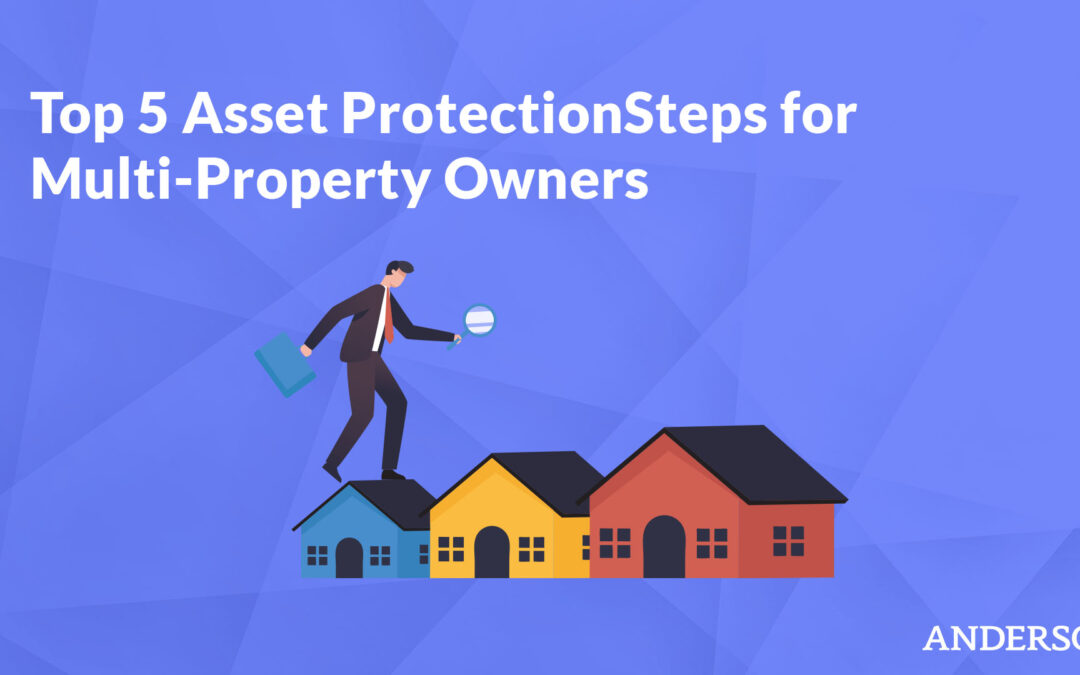Investing in real estate is one of the most popular ways to build equity and establish a steady income. However, when you own multiple properties, especially for rental purposes, you also take on more financial risk. To protect your real estate assets and keep your finances in great shape, there are a few steps to take, like establishing a trust or purchasing specialized insurance. Here are five of the top asset protection steps for multi-property owners, along with checklists for each method that you can use to guide your decisions, purchases, and applications.
Key Takeaways
- Landlord insurance can protect your investment and your personal finances by covering property damage, lost rent, and legal liability for injuries on the property.
- Creating a limited liability company (LLC) for each property you own can mitigate risk by keeping each investment a separate entity that doesn’t impact your other properties.
- Establishing a real estate investment trust (REIT) can help you gain more capital for real estate investments and save you money through tax breaks.
- By screening tenants before starting a lease with them, you’ll protect yourself from renting to someone who will pose you risks like missing rent payments and damaging your property.
- When one of your rental properties is also your primary residence, you can sometimes protect it and your finances by applying for a homestead exemption.
Tax & Asset Protection Workshop
Learn about Real Estate & Asset Protection at our next
FREE LIVE STREAM
Get Landlord Insurance
One of the most effective ways to protect your investment in each of your properties is to get landlord insurance. This is specialized insurance that protects you from financial responsibility when your properties experience damage or when someone gets injured on the premises. You can typically choose the level of coverage you want to ensure you’re covered in specific situations. For example, some common types of landlord insurance include policies that cover structure damage, legal liability, furnishings and appliances, and extra out-of-pocket expenses related to the property.
By protecting your property in the case of damages, you’ll also protect your investment by ensuring the value remains high without you having to spend your own money on repairs. You’ll also get personal protection from most landlord insurance policies, as they can cover things like liability for injuries or lost rent payments resulting from repairs. You can also sometimes add additional coverage for costs like vandalism, theft, and construction to bring a building up to code after damages.
Here’s a checklist to follow to ensure you get the best landlord insurance for you:
- Determine what type of coverage you want.
- Browse different insurance providers.
- Identify providers who offer the coverage you want.
- Get quotes for coverage.
- Add extra coverage if applicable.
- Speak with a sales agent to secure your insurance plan.
Establish a Limited Liability Company
Another popular way to protect your assets when owning multiple rental properties is creating a limited liability company (LLC) to manage the properties. Once you establish an LLC, you can use it to buy more real estate and keep all your mortgages and operating expenses in one place. However, another lucrative option is to establish a new LLC for each rental property you own. This protects your assets even further by spreading out the financial responsibility to different companies, reducing the overall financial risk you take on by investing.
For example, if you own three investment properties under one LLC that are each worth $100,000 and someone sues you, you could be liable for $300,000 when your assets get reviewed. In contrast, if you put each property into its own LLC, only the property getting sued would be included in the audit, so you’ll only risk $100,000 maximum instead of the worth of all your properties combined. To learn more about the benefits you can gain from establishing an LLC, speak with a financial advisor to review the potential benefits as they pertain to your financial status and properties.
To help you get your LLC started, here’s a checklist to use:
- Choose a business name.
- Determine who will be the registered agent.
- Obtain your state’s LLC articles of organization form.
- Complete the LLC articles of organization form.
- Submit the LLC articles of organization form to your state.
- Draft an operating agreement.
- Ensure your LLC stays active and file annual reports.
Use a Real Estate Trust
If you want to keep acquiring rental properties and protect the income you receive from them, you can establish a real estate investment trust (REIT). These trusts allow you to work with investors to fund your real estate investments, making it easier to secure potentially lucrative properties that appear on the market when you don’t have all the funds on hand needed to cover them. Using a REIT can also help you save on taxes since investors get taxed on their dividends instead of the entire trust getting taxed.
When preparing to start a REIT, there are a few details to keep in mind. For example, you’ll need to decide whether you want to start an equity REIT or a mortgage REIT, which involves funding rental properties that generate revenue and investing in mortgages, respectively. You can also sometimes establish a REIT for a specific type of property, like a residential REIT or a multifamily REIT. These are especially helpful distinctions for investors who own multiple rental properties, like apartment buildings or multifamily homes.
After you establish a REIT, there are a few requirements you’ll need to meet to keep it compliant with government regulations. For example, you’ll need to pay 90% of the REIT’s taxable income to investors through dividends, keep at least 75% of the REIT’s assets in real estate, and show that at least 75% of the gross income from the REIT comes from rental income or interest on your mortgage. Check the IRS website to learn more about the comprehensive list of requirements and look for any anomalies in your state before you start the REIT.
Here’s a checklist that will guide you through establishing your own REIT:
- Determine which type of REIT you want to start.
- Create a corporation to function as a taxable entity.
- Write a private placement memorandum (PPM).
- Locate and secure investors.
- Convert your corporation into a REIT.
- Ensure your REIT maintains compliance with state and federal regulations.
Mitigate Your Risk by Screening Tenants
When you manage a rental property, you accept a certain level of risk by allowing tenants to live in it. Since it’s not always possible to learn everything about a tenant before approving their application, there’s a risk of starting a lease with someone who might damage your property, miss rent payments, or engage in unfair litigation.
To protect yourself from this, you can mitigate the risk from tenants by creating a thorough screening process that asks for information like their credit report, history of employment, and current income. This will help you choose tenants who are responsible, able to pay rent, and less likely to cause you unnecessary problems. You can also use a similar screening process when hiring contractors to work on your building to verify that they have insurance and certification to perform the work, reducing your risk even more.
To help you reduce the risk you take on when accepting new tenants, use this checklist:
- Establish a protocol for prospective tenant screening.
- Inform applicants about each step of the screening process.
- Complete a thorough screening for each prospective tenant, reviewing their income, employment history, credit report, and references.
- Present options for renter’s insurance before finalizing a lease.
Apply for a Homestead Exemption
If you live full-time in one of your rental properties, you might qualify for a homestead exemption. This is a legal provision that reduces the property tax homeowners have to pay. It also protects your property from creditors in the case of death or bankruptcy, allowing you to prepare for unforeseen situations. This is especially important for real estate investors who share property with their spouses, as a homestead exemption helps to ensure the surviving spouse can stay in the home and avoid a forced sale while continuing to manage the rentals.
However, it’s important to note that there are a few regulations that determine who’s eligible to apply for a homestead exemption. The exact requirements you’ll need to follow will vary slightly, depending on the state you live in, so review your state’s regulations before submitting an application. Some of the most common requirements that states have surrounding homestead exemptions include having a low income, being a veteran, or having a disability. Additionally, states like Rhode Island and Massachusetts have an exemption limit of $500,000, while Pennsylvania and New Jersey don’t offer homestead exemptions at all.
If you’re interested in a homestead exemption, use this checklist to start the process:
- Verify that you’re eligible for a homestead exemption.
- Confirm that your state offers homestead exemptions.
- Determine whether you want a flat reduction or a tax exemption based on a percentage.
- Review your state’s provisions for homestead exemptions to learn how much you can save.
- Visit your state’s website to find the application for homestead exemptions.
- Collect proof that shows the home is your primary residence.
- Complete and submit the application.
These are five of the top asset protection steps you can take when you own multiple properties. Try establishing an LLC or a REIT to give your real estate investing business a cash boost and extra protection against taxes, litigation, and more. If you need extra help getting started, work with a financial advisor who can give you expert-level advice about how to best protect your real estate assets and grow your income even more.
Tax & Asset Protection Workshop
Learn about Real Estate & Asset Protection at our next
FREE LIVE STREAM














